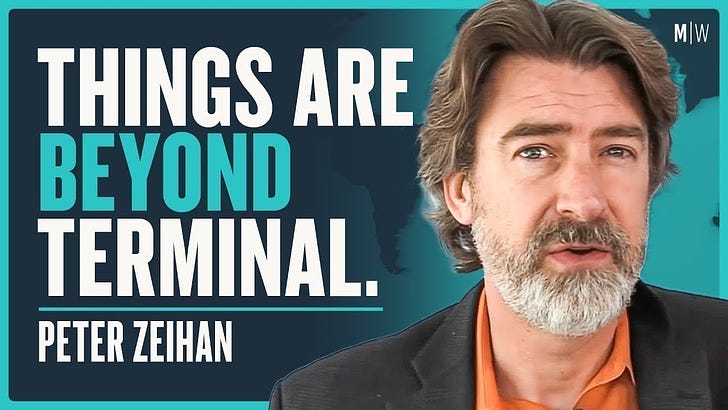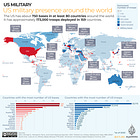‼️IMPORTANT: if you’re joining us in half an hour for our discussion with Sergei Cristo, please remember that the US has gone to Daylight Savings Time, but France has not. We’re meeting at 1830, Central European Time. To find out what time that is for you, use this handy converter.
As I wrote in the most recent edition of Global Eyes, “a striking range of sober European voices—not people normally prone to exaggeration or strange fancies—have been stating that they believe the weight of the evidence suggests that Trump is a Russian asset.” Europeans are not the only ones who are revisiting that hypothesis.
Longtime readers know that the Cosmopolitan Globalists are great fans of Peter Zeihan, who has come on our podcast and joined us for group discussions more than once. If you’re a new reader, here are some of the essays I’ve written about his ideas:
Here are some of our podcasts and group discussions with him:
I don’t agree with Peter about everything, but I always find him interesting, and I never regret listening to what he has to say. I’ve been very busy recently—and I was out of town for a week—so I missed it when he published this video:
If you’re in a rush, here’s a transcript:
Hey everyone, Peter Zeihan here. You are about to watch a video on a series that I’ve put together called The Russian Reach, which examines the role of the Russians in manipulating the current White House as well as the US government in a broader sense. For anyone who signs up for my newsletter or watches any video, for the remainder of the month, any payment that you would have normally given me for the next three months is going to a medical charity called Medshare. Medshare steps in to help out communities who through no fault of their own have temporarily lost the ability to look out for themselves. So, for example, if the Russians are bombing your power grid and the Americans are no longer providing the tactical intelligence so you can anticipate the missile strikes and position your air defense, and the Americans, furthermore, have stopped all financing to help you repair said power grid in the aftermath, Medshare steps in to help hospitals with things like diesel generators. This QR code will take you directly to the Ukraine page and that is where all of the donations will be going.
Um, this is going to be awkward. I am absolutely not a conspiracy theorist. In fact, in in the last five years I’ve spent a substantial amount of my time talking people down from theirs … but so much has gone down in the last, just, couple of weeks that I am having a hard time ascribing changes in American policy, both at home and abroad, to a more conventional theory.
This isnt MAGA policy. This isn’t policy incompetence on the part of the administration. This is something else … and bear with me as I lay it all out and we’re going to see where it goes.
I’m recording this on the 4th of March, and the two big pieces of news for the day are—let’s start with Ukraine. The Trump administration immediately suspended, or suspended, effective immediately, all military aid, of all types, to Ukraine, including anything that was in transit and had already been budgeted, paid for, palleted, and moved. With the equipment that the Ukrainians would have received from the United States, they probably could have kept fighting until midsummer without help. Now, a lot of things are up in the air.
Um, jeez, let's start with explain why this isn't a MAGA thing. A lot of people say that, “Oh, all this money has been given, like there’s big truckloads of cash going … ” Like—no. I mean, the total value of the stuff is somewhere between 150 and 185 billion, but think of it this way: When you clean out your closet at home uh to make room for your new stuff after Christmas, and you take it to Goodwill, how much do you say it’s worth when you fill out that little form? You say what it was worth when you bought it. And what the military has done, it’s basically gone through their old stores of things they haven’t used literally in decades, reported them for the cost that it took to build them, and then adjusted for inflation. And for about 70 percent of the total number, that is the donation. And so you’re talking about old equipment we weren’t using, that was marked at a value that’s probably higher than it ever was worth. The rest, 10 to 15 percent is ammo and more legitimate equipment, legitimate as in “current,” and then the rest is cash. So really, you’re talking about a total value given that’s well under 40 billion—chump change.
In addition, the Russians have been pointing nuclear weapons at me not just my entire life, since the 1960s, they have abrogated every arms agreement that the United States has ever signed with them and every conventional arms agreement they have ever signed with any country, ever, in the modern era. If there is going to be a war between the United States and anyone over the next three decades or so, it’ll probably be with the Russians. So, for having the Ukrainians, basically, take our hand-me-downs and fight the Russians to a standstill, that’s a national security win, and an economic win, by any possible measure. So I’ve seen that just twisted around and drawn as a problem.
And that’s before you consider that we now have the Trump Administration not casually, but actively, deliberately, breaking relations with all of our closest allies, up to and including the United Kingdom, and now regular calls throughout Congress not just for this or that NATO leader to resign, or Zelensky in Ukraine, of course, but actually withdraw the United States from NATO completely. Now, you might be able to say hat there’s a strategic argument to be made here. or at least a discussion to be had, and that’s fine, but this is just like one of like 20 things I want to talk with you about today. This, all by itself, this is a problem.
The second big one that happened today is the imposition of a 25 percent tariff on everything coming from Mexico and Canada. Mexico and Canada are our number-one and number-two trading partners, and everything, everything that we do in the world of manufacturing is integrated with them across borders. And so by doing a blanket tariff … what that’s basically done is made most American manufacturing nonviable, almost overnight. You know, there are certain types of manufacturing that may in time prove to be exceptions to this—there’s some very high-end stuff, like in medicines, maybe, but if it involves anything that you think of as “manufacturing,” you know, an assembly line, a production floor—that basically doesn’t stop, but it’s now no longer viable versus imported stuff that comes from beyond North America.
So the biggest winners of this by far are the Chinese, where they already have the competing industrial plant up and running. And if you look forward to the world that we’re moving to, where the Chinese are disintegrating because of the demographic situation, we have a limited amount of time to prepare for a world where the Chinese industrial plant just isn’t there, what Trump did by threatening the tariffs a couple months ago and now implementing them today is—even before today, new investment into the United States, into North America, had frozen completely, because no one knew what the situation was going to be. He introduced what we like to call “regulatory uncertainty” into the situation, and now that the tariffs are in place, and people know what the math is, no one’s going to come here, because the economic case has now been destroyed. And that will set us up for a situation, years from now when the Chinese system finally fails, where we don't have an industrial plant in place, and we’re going to have significantly higher inflation.
Trump of course loves his tariffs, and also, today he said he’s going to put a 40 percent tariff on all agricultural imports. Now, the United States is a large country that grows a lot of its own food. We’re the world's largest agricultural exporter. We have a variety of climate zones. But we don’t have all of them, and so, if you go into any supermarket, especially if you’re looking at things like fish, fruits, or vegetables, a huge proportion of those in any given season is coming from a different country. We already have a food inflation problem here, and now we’re going to have a significantly larger one. Those tariffs are supposed to kick in in April, and Trump said farmers will start producing, but the farmers can’t produce most of the stuff that we import, because it swims in a different sea, comes from a different climate zone, or, relevant to this moment, in March, looking around me at the snow, you’re not going to grow a lot of food in Colorado right now, so it has to be brought in from somewhere else. Same’s true throughout the United States in winter. We’re particularly vulnerable to Mexico, in that so we’re going to have a 40 percent tariff on top of the 25 percent tariff that’s already there.
That is enough to push, all by itself, probably 10 percent of the American population beneath the poverty line, and we’re just getting started. Let’s talk about DOGE, that Department Of Government Efficiency that Musk is—Trump is a great marketer, I will give him that, but you know, the total value of everything that Musk has rooted out of the federal bureaucracy, that supposedly was all fat, you know, we’re only at like US$30 billion, for all the disruption. Out of a seven trillion dollar budget that’s so small it should just not be worth my time to even look at, or if you look at the employees that he’s fired, right now it’s only about 1 percent of the federal workforce, and you would have to purge about 20 to 25 percent of the federal workforce just to knock 1 percent off of the budget.
Most of what’s going on in the budget is entitlement: Social Security, Medicare, Medicaid. It’s not discretionary spending. And of those workers, you know … you’ve got to understand how organizations work. There’s basically three categories of worker. At the top, you have your political appointees, which are themselves tiered between the folks that are always political appointees, that are let go at at the end of every administration. You’ve got the, one step down, who, it’s their job to make the trains run on time and they may be politicized, but they have a lot of experience in the topic, and then the next level down, while technically political employees, they’re typically never let go at the end of the administration because they’re apolitical technocrats who make operations function.
Now, the President has the authority to get rid of all three layers, and Trump has gotten rid of all three layers, throughout every individual agency in the government, even those that are not political at all and have nothing to do with foreign affairs. So for example, the Department of Agriculture. Those firings, if it has to do with provisional employees or permanent employees, generally have already been rolled back by the courts, because the Congress has not given the President the power to fire most of these people. So every time that one of those cases has come up, they’ve—basically, the courts have ruled in favor of the employees. That goes for the second class of categories as well, which are the comptrollers and the internal auditors. These are the people who make sure that fraud doesn’t get into the system and that foreign interests can’t penetrate the system. Trump fired all of them. He doesn’t have the authority to fire any of them. It doesn’t achieve anything from a policy point of view. It doesn’t achieve anything from a savings point of view.
They will all in time be reinstated, undoubtedly, unless Congress intervenes and says, “Yeah they need to go,” but what it’s done is, it’s stripped out the internal system that the US government used to prevent foreign influence from penetrating. There's nothing about that that matches with MAGA goals.
And then the third category are not your provisional employees. Those are the ones that are new, and don’t have full civil service protections. Those might be able to get fired, a little bit, but the temporary ones—the government does, a lot in a lot of places, hire people temporarily to do things that don't need to be done all the time, so for something that’s near and dear to my heart, the forest service, staffing all the national parks, that surges in the summer. Firefighters—those people have all been let go. So when we get to Summer firefighting season, this time in a couple months, a lot of the national parks probably aren’t going to be able to open. And if we have forest fires this years that’s going to be awful, fighting forest fires without firefighters. Anyway that’s inconvenient.
There’s a lot of things that these provisionals do that’s a little bit more important, like maintaining the nuclear arsenal. Trump just fired them. That doesn’t serve a MAGA goal. Or in the food supply system, people who are in USDA, the Department of Agriculture—they don’t tolerate a lot, because they know if they screw up people die, by the tens of thousands. We’re no longer testing food safety, because those are temporary jobs, and we no longer have an eye on the bird flu epidemic, because we’re not able to collect the information that we need.
Now, the mid-term solution to all this is to just hire a bunch of contractors to do it all, but that means you’re paying for the old bureaucracy that they’re not using, and you’re paying extra cash to create a new private bureaucracy, it’s expanding the budget, not contracting it. We’ve seen that in the headline figures, with all the firings, with everything that DOGE has done, the US budget expenditures have gone up compared to the Biden Administration. As to DOGE, we basically have a lot of people without Congressional authority and without security clearances that have gone into very sensitive databases started posting things on social media. We’ve got lists of government assets around the world, some open, some covert, that have just been released to the public. Stuff like this, if it gets in the hands of other states, that’s like a five-year effort of espionage—and it was just handed out. That doesn't serve anyone’s agenda in the United States.
What else. I’ve got to look at my list. I’ve got a long one. The Federal Bureau of Investigation has stopped investigating terrorism in order to focus on illegal migrants. The Department of Health and Human Services isn’t even holding the meetings that are necessary to start the process for selecting the next flu vaccine, which has the medical community freaking out because they rely on these private groups to, at no compensation to themselves, advise the government as to what type of vaccine is going to be needed based on the flu strains that are circulating, and since HHS also cut connections with the World Health Organization, we’re just kind of guessing at what’s out there, and literally relying upon the kindness of strangers to tell us what we need to get ready for.
USAID, that’s the Agency for International Development, it got a lot of crap for doing some strange things, that’s fair, but if you’re not going to invade or occupy a country, USAID is the primary method that the United States to uses to influence countries around the world. You can call it whatever you want, the bottom line is when it’s not present, the Iranians, the Chinese, and the Russians absolutely dominate the space, because they will step in with relief, support, that is loaded with intelligence operations, and all of a sudden, they’ve gone from meeting USAID head-to-head to having a completely open operating environment, and so of course the Iranians and the Russians sent a joint letter to the Trump Administration thanking them for making life so much easier for them.
Or in the Defense Department, we canceled all operations against Russian cyber activity, that includes defensive operations on our part, as well as offensive operations to disrupt their ability to hack the United States. The Russians maintain a very active cyber presence, they’re not just hacking our elections and our media and our power grid and our water and our food supply and the stock market, they’re going after you, specifically, because part of the Putin alliance that rules Russia includes organized crime out of St. Petersburg, and so most of those cyber things are linked to Russia in one way or another. And we have basically decided just to lay back open our legs and let whatever happens, happen. This isn’t MAGA. This isn’t Toddler Syndrome. This isn’t even incompetence. This is too much, too soon, too holistic. This isn’t an abdication of American power. This isn’t mismanagement. This is a deliberate disassembly of the building blocks of American power and security and safety.
This isn’t anything that I would think that any American would ever want, much less orchestrate, which has pushed me into the realm of some some conspiracy theories. I think we now need to consider that the Russians really have penetrated the White House. And while I think it’s a stretch to say this is like a Manchurian Candidate sort of situation, there are too many things happening that seem too tailored to hobble American capacity, long-run—and everything that was on this list is something that the Russians have tried before. NATO is something they’ve been trying to destroy since the 50s, and now we have a possibility of the US just walking away. The military has been the bulwark of global security, and so gutting it from the inside is something they would love to see. Our intel system has been the canary in the coal mine, and it appears that Trump is either not receiving or not reading the Daily Brief that the agency produces for him every day. The food supply situation in the United States has long been the world’s safest, and now we’re not even testing to maintain it.
The demographics of Russia are one of the main reasons why the Russians are facing such a bleak long-term future, but if you interfere with the vaccine schedule in the United States, you can start increasing the death rate in Americans not just under 20, but under five, and start to equalize that situation.
This is some heavy stuff, and what we’re going to be doing in the next few videos are exploring all of this from the Russian point of view. How they see the world. How they influence the world and, given the chance, how they would redirect American policy to serve their interests, I would love to say this is hypothetical but I’ve already got a dozen examples in addition to the ones I just shared with you about how that is already happening.
So buckle up, because for the first time since I started doing this, 25 years ago, I’m actually worried for the United States.
We’ll talk about that, too.
I want to send this out before our conversation with Sergei, so I’ll leave it at this for now. Later today, I’ll share some of my thoughts about this. Suffice to say, I agree: This is too much, too soon, too holistic—and to deleterious to United States, and too advantageous to Russia—for us to understand this in terms of conventional political science.
Join us to discuss this and much more. If you can’t, I'll post the video afterward.’












"This is too much, too soon, too holistic—and to deleterious to United States, and too advantageous to Russia—for us to understand this in terms of conventional political science."
Is it even possible to use a word like "holistic" in reference to Trump's decision making? He's mentally ill. What a lot of people are concluding is that it is not necessary to understand Trump's motivations. We can note he's had a multidecade pattern of supporting Russia, as I heard you mention on podcast with Tim Mak.
Zeihan’s latest analysis paints a stark picture: the sheer breadth and speed of Trump’s policy decisions—freezing Ukrainian aid, gutting American industrial competitiveness, dismantling federal infrastructure, and severing alliances—align too neatly with longstanding Russian strategic objectives to be written off as mere incompetence. This isn’t just a reckless president making erratic choices; it looks increasingly like an intentional restructuring of American power in ways that benefit Moscow at every turn. As Zeihan notes, this is the first time in his 25-year career that he’s genuinely afraid for the future of the United States. That fear, echoed by many sober European analysts, suggests that we are no longer dealing with just a geopolitical rivalry but with an internal unraveling driven, knowingly or unknowingly, by forces hostile to American interests.
If American power is a great ship, it is no longer merely drifting—it appears someone is deliberately punching holes in the hull while disabling the pumps. The question is whether this is an act of sabotage from within or a captain so deluded he believes he can scuttle the vessel and somehow still reach port. Either way, the storm is already upon us, and those who refuse to acknowledge the water rising at their feet will find themselves drowning in history’s tide.